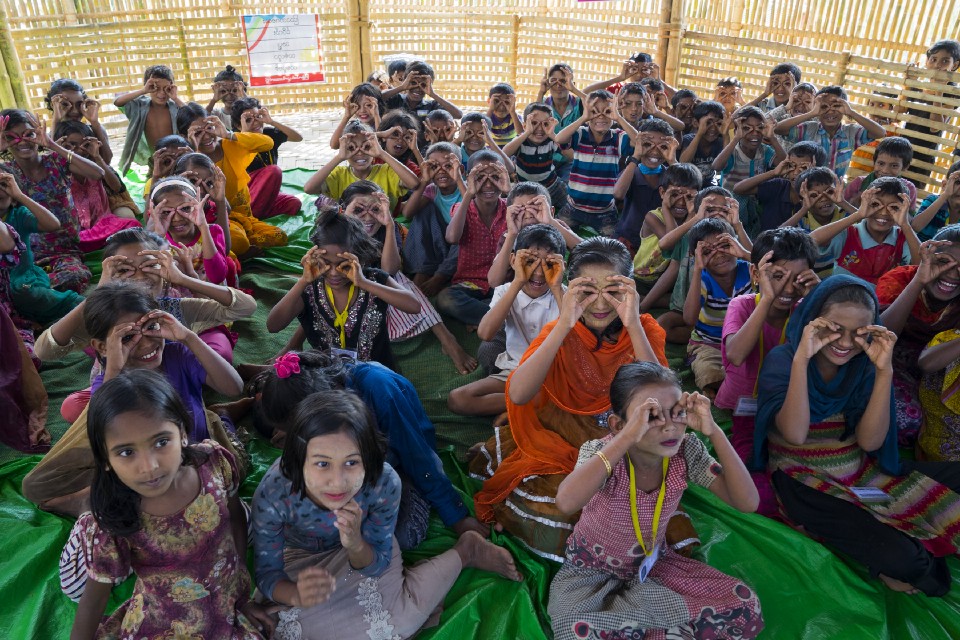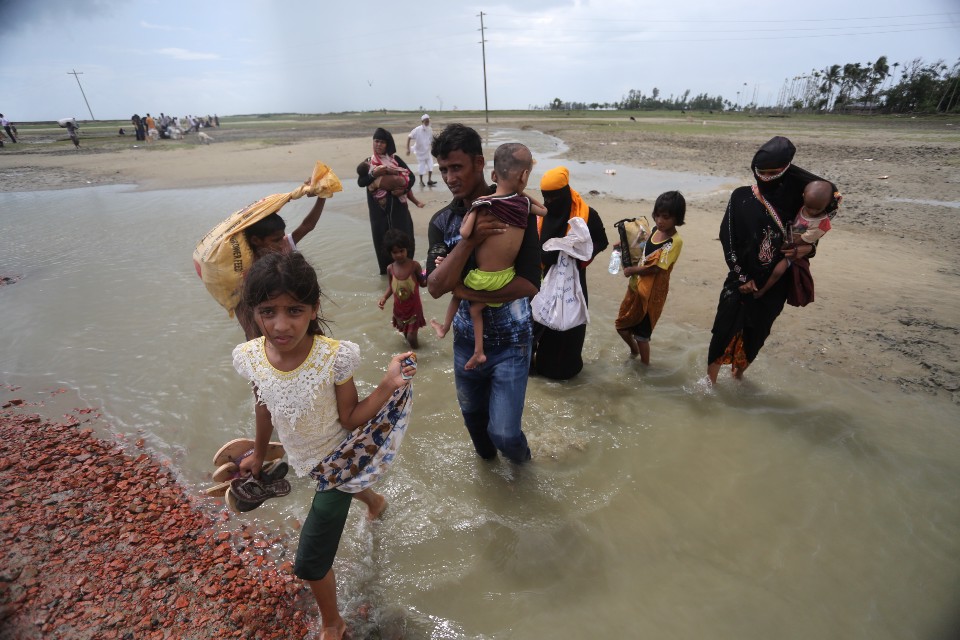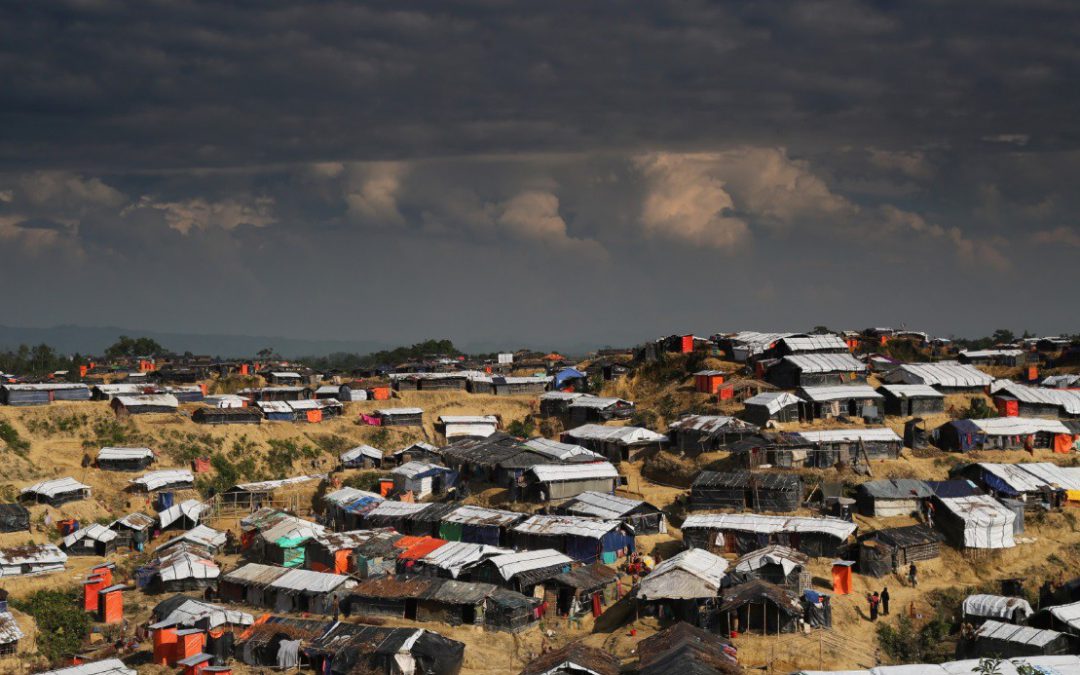In August 2017, when thousands of Rohingya families arrived each day, fleeing from genocide across the border, before the government and humanitarian agencies could set up the most rudimentary settlements, it was the locals who opened up their own homes to give the victims their first respite.
Despite Cox’s Bazar being one of the poorest districts in Bangladesh, there was a sentiment here that we should support our brethren who were fleeing unthinkable brutalities across the border. Why is that kindness now giving way to tension and fear?
From above, the massiveness of the camps is disconcerting: hill after hill crammed with tarp and bamboo structures, where only two years ago elephant herds ruled the lush green forest, which was also a great resource for locals. Now, there isn’t a tree in sight. The bare yellow sand reflects the oppressive heat, which saps all your energy.
At the foot of a hill in camp 12, poetry can be heard from a classroom full of voices which seem to have no want of energy. A four-and-a-half-year-old boy standing in front recites from memory. Some 30 students seated on the floor repeat after him. It goes on for several minutes, the leader and the led equally entranced by the lines, their voices waxing and waning with their cadence.
Momentarily, students of a Friendship Temporary Learning Centre forget the hopelessness of the situation they’re in: exiled from home, trapped within the confines of a refugee camp, with little access to comprehensive education or security.
“Hopelessness is the most difficult situation for a young adult to be in,” says Ayesha Tahsin Khan, director of Inclusive Citizenship at Friendship. “Seeing no light at the end of the tunnel, adolescents will become involved in harmful activities. We have to create opportunities and keep young people busy developing their skills and creativity.”
Friendship’s learning centres are housed in spacious rooms, illuminated by large windows, decorated with balloons and equipped with toys, games and stationery. Artwork by children adorns the walls.
“We have invested in the best toys,” says Ahmed Toufiqur Rahman who oversees the schools at Friendship. “Children even come from other learning centres to play here.”

In addition to academic content, the Friendship curriculum includes a code of ethics. “We are trying to make them enlightened young people, who are not only learning from books but also how to be good human beings,” says Toufiq. “They are learning what it means to be brave, honest, and compassionate.”
Meanwhile, the mothers learn to stitch quilts. And while they can’t sell them, the women still benefit from learning, says Toufiq. “Women who were previously reserved and isolated are now more social. They have the confidence of people with the ability to provide for their families.” And they get to keep the quilts.
After class, the children enjoy a nutritious lunch. They strut elegant uniforms on their way home. But when they return, it’s to a bleak future.
Coming into Bangladesh as displaced Myanmar citizens they are not in a position to work to fend for themselves, so fathers have lost their role as providers for their families. “For men, this creates a lot of pressure,” says Ayesha. “It causes a crisis in their masculinity. These pent-up frustrations can cause depression and lead to violent behaviour.”
The feeling of insecurity of belonging nowhere for over years, over generations is being expressed through sexual violence within families. Friendship’s health services have trained members of the public to be “change-makers”, trained as advocates to spread awareness among men and women about issues surrounding gender-based violence, and link camp residents to counselling and support services for victims.
Other kinds of violence are also on the rise. The Daily Star reported 31 killings in the camps since August 2017. There has also been the rise of informal trade in the camps, with rivalry over market control. Locals worry about trade in drugs and sex in the camps.
“This is the kind of activity that comes out of unhappiness and frustration and seeing no hope,” says Ayesha.

“Bangladesh has opened its borders to a million people in need of shelter and treated them with kindness. But this is not the eventual solution,” says Ayesha. The UN Charter of Rights gives every individual the right to citizenship, but the Rohingyas had remained deprived of this right, in their very homeland, and are still in the same position today. They cannot have security without having a home, and no one country can figure out how to make this happen. This has to be the responsibility of the international community, and not only Bangladesh.
Meanwhile, the only way to bring hope to the community is through education, so that they are better equipped to be contributing members of society wherever in the world they eventually end up.
Nurturing spaces where hope can flourish, and minds are occupied positively rather than becoming involved in wayward activities, will help ease tensions in and around the camps.


